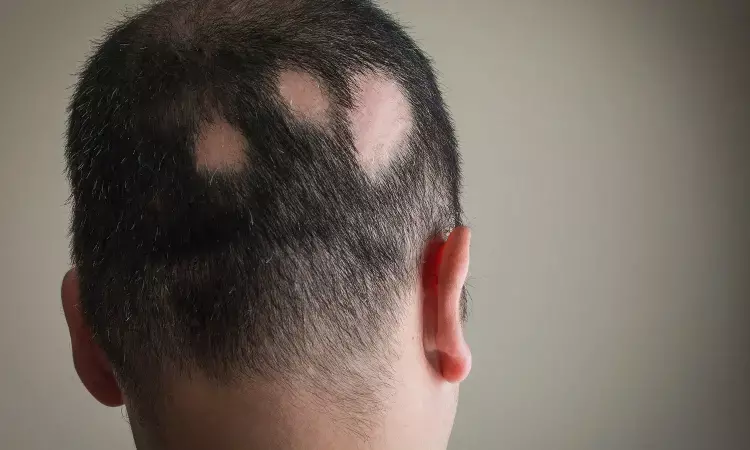- Home
- Medical news & Guidelines
- Anesthesiology
- Cardiology and CTVS
- Critical Care
- Dentistry
- Dermatology
- Diabetes and Endocrinology
- ENT
- Gastroenterology
- Medicine
- Nephrology
- Neurology
- Obstretics-Gynaecology
- Oncology
- Ophthalmology
- Orthopaedics
- Pediatrics-Neonatology
- Psychiatry
- Pulmonology
- Radiology
- Surgery
- Urology
- Laboratory Medicine
- Diet
- Nursing
- Paramedical
- Physiotherapy
- Health news
- Fact Check
- Bone Health Fact Check
- Brain Health Fact Check
- Cancer Related Fact Check
- Child Care Fact Check
- Dental and oral health fact check
- Diabetes and metabolic health fact check
- Diet and Nutrition Fact Check
- Eye and ENT Care Fact Check
- Fitness fact check
- Gut health fact check
- Heart health fact check
- Kidney health fact check
- Medical education fact check
- Men's health fact check
- Respiratory fact check
- Skin and hair care fact check
- Vaccine and Immunization fact check
- Women's health fact check
- AYUSH
- State News
- Andaman and Nicobar Islands
- Andhra Pradesh
- Arunachal Pradesh
- Assam
- Bihar
- Chandigarh
- Chattisgarh
- Dadra and Nagar Haveli
- Daman and Diu
- Delhi
- Goa
- Gujarat
- Haryana
- Himachal Pradesh
- Jammu & Kashmir
- Jharkhand
- Karnataka
- Kerala
- Ladakh
- Lakshadweep
- Madhya Pradesh
- Maharashtra
- Manipur
- Meghalaya
- Mizoram
- Nagaland
- Odisha
- Puducherry
- Punjab
- Rajasthan
- Sikkim
- Tamil Nadu
- Telangana
- Tripura
- Uttar Pradesh
- Uttrakhand
- West Bengal
- Medical Education
- Industry
Tofacitinib Outperforms Azathioprine in Treating Alopecia Areata, New Study Finds

Pakistan: A recent double-blind, randomized controlled trial has provided new insights into the efficacy and safety of two alopecia areata (AA) treatments and their variants: tofacitinib and azathioprine.
The study, published in the Archives of Dermatological Research, revealed that tofacitinib efficacy was significantly higher than azathioprine in promoting hair regrowth in patients with alopecia areata and its variants. Both drugs, however, were well-tolerated, with no major differences in adverse effects between the two treatments.
Alopecia areata is an autoimmune condition characterized by sudden hair loss in small, round patches. Tofacitinib, an oral Janus kinase (JAK) inhibitor, has gained attention for its potential to treat autoimmune conditions, including AA. Azathioprine, on the other hand, is an established immunosuppressive medication commonly used to treat various autoimmune diseases. Despite their differing mechanisms, both drugs have been explored for use in treating AA, but there has been limited research comparing their relative effectiveness and safety.
To fill this knowledge gap, Majid Paracha, Department of Dermatology, Medical Teaching Institute-Lady Reading Hospital (MTI-LRH), Peshawar, Pakistan, and colleagues aimed to evaluate and compare the safety and efficacy of tofacitinib and azathioprine in patients with AA and variants.
For this purpose, the researchers conducted a double-blind randomized controlled trial (RCT) at the Department of Dermatology, Medical Teaching Institute-Lady Reading Hospital (MTI-LRH), Peshawar, Pakistan. The study included patients aged 12 years and older, diagnosed with alopecia areata (AA), alopecia totalis (AT), or alopecia universalis (AU), all of whom had at least 50% scalp hair loss for 6 months or more. Participants were randomly assigned to receive oral tofacitinib 5 mg twice daily (Group I) or oral azathioprine 2 mg/kg body weight once daily (Group II).
The primary endpoint was the Severity of Alopecia Tool (SALT) score, evaluated at baseline and again at a 6-month follow-up. Safety assessments were carried out consistently throughout the study.
The findings of the study were as follows:
- 104 patients were randomly allocated into the tofacitinib group (n = 52) or the azathioprine group (n = 52).
- The mean age of patients was 20.23 years in the tofacitinib group and 22.26 years in the azathioprine group.
- The mean disease duration was 6.59 years in Group I and 7.98 years in Group II.
- 38.5% of patients were adolescents, and 67.3% were male.
- 50% had alopecia areata (AA), 35.5% had alopecia totalis (AT), and 14.5% had alopecia universalis (AU).
- The mean baseline Severity of Alopecia Tool (SALT) score was 91.02 ± 10.21 in the tofacitinib group and 91.02 ± 10.63 in the azathioprine group.
- At the 6-month follow-up, the SALT score improved to 14.1 ± 24.6 in the tofacitinib group and 63.9 ± 33.9 in the azathioprine group (difference of 11.5 points).
- No major adverse effects were observed, and there was no significant difference in minor adverse effects between the two groups (4 adverse events in the tofacitinib group and 8 in the azathioprine group).
"The study suggests that while tofacitinib demonstrated superior effectiveness, both medications are safe options for managing AA. The findings highlight tofacitinib as a promising therapeutic alternative for patients, though further research is needed to confirm these results and evaluate long-term safety," the researchers concluded.
Reference:
Paracha, M., Wasim, M., Noor, S.M. et al. Comparison of efficacy and safety of tofacitinib and azathioprine in patients with alopecia areata and variants: a double-blind, randomized controlled trial. Arch Dermatol Res 316, 458 (2024). https://doi.org/10.1007/s00403-024-03203-w
Dr Kamal Kant Kohli-MBBS, DTCD- a chest specialist with more than 30 years of practice and a flair for writing clinical articles, Dr Kamal Kant Kohli joined Medical Dialogues as a Chief Editor of Medical News. Besides writing articles, as an editor, he proofreads and verifies all the medical content published on Medical Dialogues including those coming from journals, studies,medical conferences,guidelines etc. Email: drkohli@medicaldialogues.in. Contact no. 011-43720751


